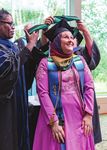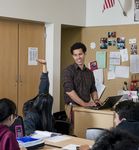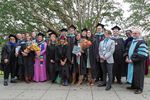2018-2020 BECOME A TEACHER Plant the Seeds of Justice - The Evergreen State College
←
→
Page content transcription
If your browser does not render page correctly, please read the page content below
J. Patrick Naughton, Director of the MiT
Program, Ed.D. Curriculum Instruction,
Seattle Pacific University, 2006; M.B.A.
Southern Illinois University, 1978; B.A.
Political Science, Gonzaga University, 1969.
Plant the Seeds of Justice— Become a Teacher
If you are a passionate, critical thinker with a strong desire to make a real difference in your community, then become
a teacher through The Evergreen State College’s Master in Teaching (MiT) program. The goal of the MiT program is to
develop teachers who become leaders in promoting anti-bias work, social justice, and equity in education by creating and
enacting opportunities for ALL kids to learn.
Our nationally recognized MiT program takes an integrated, inquiry-based approach to teacher certification. We explore
how public education can meet the needs of the diverse peoples who live in our democracy.
We examine what it means to base teacher education and public education on a multicultural, democratic, developmental
perspective and investigate how evidence-based assessment can promote these values. We provide opportunities for
prospective teachers to question their cultural perspectives and worldviews, to gain a broader and deeper understanding
about the diverse cultures that compose our society, and to develop new understandings about teaching and learning. MiT
candidates graduate with knowledge and skills necessary to create learning environments that support student engagement
and achievement, and gain the capacity to advocate for a more just and equitable society.
We will host the 2018 – 2020 MiT cohort at the Olympia campus and look forward to having you join us there. We invite you
to apply to our MiT program and hope you will find this catalog a useful introduction. If you would like more information or
have any questions about our school and our program, please don’t hesitate to call or email us—or come for a visit! Current
MiT students are always willing to talk with you about the wisdom of choosing the best possible career — teaching — and
about their experiences here at The Evergreen State College.
Welcome to Evergreen’s MiT Program!
Sincerely,
J. Patrick Naughton, Ed.D.
DirectorMaster in Teaching ON CAMPUS IN OLYMPIA 2018–2020
About MiT 2
Conceptual Framework 3
MiT Olympia 2018–2020 Current Candidates 4
A tranquil, wooded campus just off Highway 101.
MiT Faculty 6
”I went into education because I wanted Helpful MiT Program Staff 8
to do something that helped better our
Expectations and Outcomes 9
community and improve our future.
Program Structure 10
A quality education, both in academic skills
and social skills, is the key to ensuring that What Is an Endorsement? 12
our students are ready for life.”
— Rand Hodgson MiT ‘10 Admissions Information 13
State-Required Admissions Tests 14
Application Information 15
Application Checklist 16
Endorsement Policies and Requirements 17
MiT Alumni Recognitions and Awards 23
MiT Alumni Stories 23
Financial Information 26
Regulations 28
Resources 29
Find us on Facebook at facebook.com/Evergreen.MiT
All photos by Shauna Bittle '98, unless otherwise noted.
Rand Hodgson MiT ‘10, The Evergreen State College PK-12
Distinguished Educator of the Year, 2017. Rand was nominated
for his work in the expansion of the Positive Behavior Inter- Cover photo: Michael Joshua, MiT ‘07, Gray Middle School
vention and Support (PBIS) District Coaches Group and the math teacher, Tacoma, Wash.
promotion of graduation rates, and attendance for the North
Thurston School District.About MiT
A DIFFERENT KIND OF TEACHER EDUCATION PROGRAM
Evergreen’s Master in Teaching (MiT) program is a nationally recognized, academically rigorous, state-accredited teacher
preparation program. Its success lies as much in the collaborative learning process as it does in its curricular content. Through
academic subjects, candidates are exposed to a wide range of community-building activities, small-group seminars, hands-on field
experiences, and group problem-solving activities. These skills reinforce critical and reflective thinking and demonstrate important
principles of effective and meaningful classroom teaching. Our graduates become knowledgeable, competent professionals who
can assume leadership roles in curriculum development, child advocacy, assessment, and anti-bias work.
COORDINATED STUDIES CURRICULUM Evergreen’s innovative program was a direct result of a
1987 law passed by the Washington State Legislature. The
MODEL: AN INTERDISCIPLINARY APPROACH program is founded upon a strong theory base, substantial
By organizing the curriculum around themes and questions, involvement with schools, sensitivity to multicultural and human
coordinated studies is an intentional departure from the relations, a variety of instructional strategies, emphasis on new
fragmentation of separate, unconnected courses and provides a technology and research, and close cooperation with K–12
teacher preparation program without course boundaries. The teachers and administrators.
full-time, two-year program integrates Washington State
requirements, essential teaching skills, and rich intellectual The MiT program meets all state of Washington Administrative
explorations to help candidates answer important questions Code standards for program quality and beginning teacher
about the nature of teaching, learning, and schooling. competence. Graduates receive a Master in Teaching degree
Competition is de-emphasized, while collaboration among and are recommended by the college to the state of
candidates, faculty, and K–12 teachers is encouraged. Washington for Residency Teacher Certification, provided that
the state-required performance assessment, the edTPA, is
How does this happen? passed and all other program requirements are met.
A climate is created in which interactive learning can occur and
candidate input is valued.
An interdisciplinary team of 35 to 40 candidates and three
faculty members form a community of learners to explore
curricular themes.
Essential topics are examined, including assessment, equity
education, and cultural competencies, integration of literacy,
sustainability, math, arts across the curriculum, and child and
adolescent development.
Candidates spend time each week working and observing in
a K–12 classroom in year one and complete two quarters of
student teaching in year two.
During weekly seminars, one faculty member and 15 candidates
analyze readings and review experiences in K–12 classrooms.
Candidate self-assessment and reflection are integral parts of
the program.
Candidates regularly use web-based and other computer
technologies to support their learning and develop their skills in
meeting the needs of K–12 students.
PROGRAM HISTORY
The Evergreen State College was chartered by the State of
Washington in 1967 for the purpose of offering an alternative to
“traditional education.” Today, Evergreen’s Master in Teaching
program mirrors the original alternative nature of the college
with its cross-curricular, interdisciplinary programs. MiT empha-
sizes an interactive dialogue among faculty and candidates,
graduate-level writing skills, and narrative evaluations in place of
letter grades. As one of Evergreen’s graduate-level professional
studies programs, we are committed to personal and profes-
sional growth and to bridging theory and practice for Trinity Rossi MiT ‘13, student teaching at McKenny Elementary
meaningful, lifelong learning. School in Olympia.
2 about MiTHadiya Biglow MiT ‘18
works with students
in the classroom at
Olympia High School.
Conceptual Framework
PRACTICE-BASED TEACHER EDUCATION
How can public education meet the needs of the diverse peoples who live in our democracy? This is the central question explored
by the Master in Teaching program. We examine what it means to base teacher education and public education on a multicultural,
democratic, developmental perspective and how evidence-based assessment can promote these values. Our program employs a
transdisciplinary perspective that creates an integrated, inquiry-based approach to teacher development. Teacher candidates become
members of a cohort in a professional learning community while local school districts and communities provide extensive field
experiences, including two 10-week student teaching assignments. While acknowledging the social, cultural, and political contexts
of teaching, we address three major concepts throughout the MiT curriculum. We carefully explore how theory and practice in each
conceptual domain outlined below effectively support teacher development and student learning.
Social Justice and Multicultural Theory and Practice We analyze ways in which power and privilege reproduce
The curriculum of teaching and teacher education is rooted and maintain opportunity gaps in a democracy operating
in Evergreen’s strong commitment to diversity because we within a state-supported, advanced capitalist economy. We
believe that both teaching and learning must draw from many help candidates to understand the evolution of our current
perspectives and include a multiplicity of ideas. Future teachers democracy and to critique practices that exclude particular
must provide K-12 students with culturally relevant, equitable groups from equitable participation in society. We also consider
learning experiences and opportunities to develop critical what it means to work and learn in various communities,
consciousness. Rather than erasing or marginalizing differences, avoiding the notion of neutrality in place and context, because
we examine and consciously act on differences such as ethnicity, we believe teachers are transformative intellectuals whose work
race, class, gender, culture, religion, language, ability, sexual disrupts dominant ideologies for the purpose of building and
identities, and gender expression. MiT candidates examine maintaining a healthy democracy.
the underlying assumptions of their cultural perspectives
and worldviews in order to develop equity mindsets and Developmentally and Socioculturally
critically conscious teacher identities. By doing so, we reveal Appropriate Teaching and Learning
that education is both a cause and a cure for systemic racism We know that teachers need multiple strategies to respond
and educational inequity. Teachers have a moral and ethical fully to the complex, culturally situated, cognitive processes
responsibility for dismantling systemic racism and educational associated with learning. Yet we also understand that all
inequity. Activism and advocacy must be rooted in effective students benefit from teachers who facilitate rigorous,
teaching for all students. meaningful, and relevant instruction that provides equitable
access to learning opportunities. We recognize and honor
Democracy and Schooling the cultural wealth that students and families bring to school.
We believe democracy is a multi-dimensional concept. We We believe instruction must be built on that wealth. From
guide teacher candidates to reflect on and enact a) democratic this foundation, teachers need to develop culturally relevant,
classroom learning environments that are learner-centered, integrated, developmentally appropriate curriculum that invites
collaborative, and empower student voices; and b) democratic, active engagement and expands learner interests, perspectives,
school-based decision-making that is inclusive of families, and worldviews.
community members, school personnel, and students.
conceptual framework 3In Their
Own
Words: Riel LaPlant
of the Blackfeet Nay
tion Michelle Tate
Elementary Education
Secondary Biolog
“I was born on the Blackfeet Indian reser- In her twenties, Michelle earned a degree
Current vation in Browning, Mont. I would express in interior design, while she was eight
the plight of my home situation through months pregnant. She went to work in
2016 - 2018 disengagement with school, running away that field for several years before being
from home, and a laissez-faire attitude laid off in the economic downturn of 2008.
Candidates toward my future. Under my grand- “As it turned out, what some consider a
mother’s patronage I learned my tragedy became my fortune—all of the
indigenous language, attended ceremo- money that job paid never quite left
nies, developed a love of running, grew as me fulfilled.”
a reader, enhanced my storytelling skills,
and fell in love with school. I went from Working with children wasn’t what she
failing every class in middle school to had in mind when she was suddenly
acing every assignment in high school. I thrown into a volunteer position. “It didn’t
was accepted to Stanford University on a take long for me to realize that paid or
full-ride scholarship where I did a Native not, this was something I would do no
American honors thesis in education and matter what—both for myself and the
started to envision creating my own kids. For eight years I’ve inched my way
school. After graduating I came to a cross- from an Associate’s Degree toward near-
road in deciding how to reach my goal ing the end of my first year in the MiT
and decided on The Evergreen State program. I offer this glimpse of context to
College’s Master in Teaching, because you, it’s unique to anyone who’s never
most importantly I had seen numerous known someone to stick undeterred to a
alumni help students transform their lives goal as a single mom and a mountain of
on their own terms. The Evergreen MiT student loan debt just to be a teacher!”
program makes social justice a focal point Michelle spent three years as a childcare
in their curriculum. I think social justice school site director for the YMCA and
within education is essential for students gained experience working with school-
of color, mine especially, because it aged children while finishing her
teaches them the root causes of dysfunc- bachelor’s degree. She describes upon
tion in the communities. Once students completing MiT and taking her first posi-
are able to understand the root of their tion “Before the day begins, I remind
community’s problems, they are better myself why I am there. This classroom will
prepared to not only uproot systems of be a safe sanctuary where I will remain
oppression from their own lives, but the vigilant to the harms of bullying, ridicule,
lives of others around them. While in the and racism. All languages and ethnicities
program I noticed a disconnect between are encouraged to be embraced and
my practicum site teachers and urban appreciated. I will strive to build a space
Native youth and decided on creating a for open-minded and empathetic thinkers
cultural bridge between them. I applied to flourish and grow in wisdom. There will
for the Billy Mill’s Dreamstarter grant and be no empty stomachs or hunger or argu-
won $10,000 to make this idea a reality. ments left unresolved, no insecurities
ignored.”
I hope to teach for a number of years,
acquire a doctorate of education, be In order to become that teacher I envision,
involved in national native politics, and and to endure the challenges ahead as
eventually start my own school for native our country faces turbulent times in public
youth. I want my school to be an incuba- education, I need Evergreen’s Master in
tor for social change, like how in my own Teaching program to immerse myself in
life, my grandmother was a catalyst for the social justice framework that I pledge
critical thinking.” to fight for.”
4 current candidatesKyla Stelling James Jarnagin Ryan Campeau
Secondary English Lan Chemistry Theatre Arts + Ele
guage Arts Secondary Physics and mentary
Kyla’s high school lunch hours were spent in “The first time I realized my passion for teach- “For as long as I can remember, I said that
her favorite English teacher’s classroom ing came about when I tutored geometry in I would be a teacher or an actor, and
where a small group of students congre- high school James said.“ From the begin- throughout high school and college I pur-
gated for discussions of literature and ning it was always about eliciting the sued the theater arts as well as volunteer
philosophy. After an English degree from knowledge the individual had and trying to teaching. While I was studying abroad I
UW, experience as a copywriter and writing keep it as inquiry-based as possible. It is not taught English to French students. I found
tutor to teens, and retail manager, she rec- the answer that is important, it is the process the act of teaching so rewarding that it
ognized the common thread of the person to get to that answer that is essential to became my sole goal after college. I recog-
she was as a teenager and who she is today. learning. That brief moment of understand- nized my need for a solid foundation in the
“I love to listen to people and find ways to ing something is why I want to teach. philosophy and methods of a transformative
empower them. My energy and creativity Comprehension leads to confidence, the educator, so I began to look for teach-
skyrocket when there is an opportunity to confidence guides the student to better er-preparation programs in Washington
assist and inspire someone to reach their decisions, and those better decisions state that had a strong foundation in social
goals.” I had considered being a teacher for improve both the individual and the justice pedagogy. I dreamed of blending
many years, because of its mentorship role, community around them.” theater into my work with elementary and
but also because it involves work with youth. middle school youth in an interdisciplinary
As a long-time nanny, I’ve loved working James began his college education studying way. While I considered completing an
with kids—I find their energetic, inquisitive, traditional sciences at Louisiana State Uni- online program so that I might live at home
and brutally honest nature refreshing. I’ve versity, but finished at Evergreen for its to support my family, I knew from prior
worked with kids who incessantly push “unique blend of content integration and experiences with online classes that I could
boundaries or strictly adhere to the rules; instruction engaging with as many view- gain so much from struggling through ideas
have oodles of confidence or are stifled by points as possible. This integration of ideas with a cohort and professors. After two
their own shyness; struggle or excel in aca- is what helped with my success. The meth- quarters of the Evergreen MiT program, I
demics; and come from broken or ods used for my learning experience are feel more convinced than ever of the right-
supportive homes. I’ve enjoyed every single similar to how I would have wanted to have ness of my choice.
kid I’ve worked with—they’re all gems, been taught in high school.”
some just need a little extra support in dis- The program has shown me the importance
covering their worth. It would be an honor James balanced a workload as a Target store of recognizing my positionality and that of
to be in a position where I can kelp kids supervisor with his BS coursework and AVID my students, of learning about their cultural
reach their goals through academics, as I tutoring in a local high school prior to entry backgrounds, language, community, and
feel knowledge is the greatest tool one can into MiT. His specific focus will be for both cultural values in order to serve them. It has
have.” Kyla said she was befuddled by the physics and chemistry. “This will allow me to made me into a better person as well as
social inequality she witnessed while living bridge gaps between the two and explain teacher in forcing me to consider more
in Seattle and Los Angeles. She prepared to the deeper connections of the mechanics of deeply my role in society, the privilege that
apply to certification programs by doing matter—making those seemingly hard con- has shaped me, and how I too am complicit
observations in schools, including one cepts less daunting.” in maintaining systems of social injustice.
known for its low-income community. One
class of third graders at that school took “I chose Evergreen because I wanted to I look forward to a career in which I will
time each morning to go over civil rights break the habit of traditional science class- serve key [Latinx] communities in my home
and the Bill of Rights, where children recited rooms and create an environment that state through education, the best means for
the information with exuberance. inspires science in all disciplines. Evergreen’s social and personal transformation.”
interdisciplinary approach, along with the
“The community nature of the classroom and critical focus of social justice, will help me be
the instructor’s guidance ensured a commu- the best teacher for every student I have
nity culture of acceptance. That teacher, Mr. because everyone deserves to learn.” For alumni stories see page 23.
Ryan Reilly MiT ’07, attributes much of his
technique to Evergreen. Based on what I’ve
seen, I believe Evergreen’s in-depth two-
year program will thoroughly prepare me to
step into a classroom and be ready to effec-
tively serve.”
current candidates 5Meet the MiT Faculty
PHYLLIS ESPOSITO
Ph.D., Curriculum and Teaching,
University of Kansas, 2011;
MiHE, Integrated Humanities and
Education, Rockhurst University,
1999; B.A., Elementary Education,
Rockhurst College, 1997.
My interests focus on issues of
equity and social justice in science
education. My teaching draws
from qualitative and critical race
theory methodologies to examine
collaborative, field-based practices
among colleges, schools,
and in communities.
SONJA WIEDENHAUPT
Ph.D., Social/Personality Psychology,
University of California at Berkeley, 2001;
M.A., Developmental Psychology, Teachers
College, Columbia University, 1991; B.A.,
Psychology, Wheaton College, 1988.
My interests include developmental, social,
and personality psychology, educational
theories and practices, coaching strategies,
the physiology of the brain, cultural studies,
and arts integration.
6 MiT facultyERICA HERNANDEZ-SCOTT
Ph.D., Teacher Education and Curriculum
Studies and Educational Leadership,
Policy, and Foundations, University of
Missouri – Kansas City, 2017; MA,
Curriculum and Instruction, University of
Missouri – Kansas City, 2008; B.A.,
Elementary Education, Rockhurst
University, 2000.
My interests include elementary
education, teacher education,
multicultural education, and teacher
identity. My work is grounded in the belief
that students, families, and communities
have strengths, that when utilized as
assets by teachers, can transform the lives
of children, schools, and society.
SUNSHINE CAMPBELL
Ph.D., Curriculum and Instruction, University of Washington,
2012; M.Ed., Mathematics Education, University of
Washington, 2007; B.A., Mathematics Education, Western
Washington University, 1997.
My interests include the ways in which teachers learn how
to enact teaching practices that disrupt patterns of inequity,
particularly through the integration of classroom field
experiences and coursework.
On sabbatical 2017–2019 to teach in India.
TERRY FORD
Ph.D., Literacy Education, Washington State University, 1993;
Ed.M., Secondary Education, Washington State University, 1988;
B.A., English, Whitman College, 1983.
My interests include studies in literacy education, language
acquisition, developmental psychology, secondary education,
technology, qualitative research, adolescent literature, multicul-
tural and critical pedagogy, and interdisciplinary curriculum. My
book on becoming multicultural explores through the voices of
students of color how ethnicity affects the learning process.
Additional adjunct faculty with expertise
in other areas will join the team.
MiT faculty 7Helpful MiT Program Staff
From your first question about MiT to job placement and beyond,
Maggie and Loren are here to help you.
MAGGIE FORAN
I’ve worked in education for more than 35 years in a large variety
of roles, all of which inform my work as the Associate Director for
Advising and Certification for the MiT program. I draw on my
experiences as a former high school social sciences teacher, a uni-
versity admissions counselor, and a community college counselor
and instructor in order to support our prospective and practicing
teachers. As Evergreen’s certification officer, I stay current with
Washington’s teacher preparation rules and regulations, as well as
make sure that our admissions and certification documentation is
complete and properly maintained. The fruit of all of this work
comes on graduation day, when I recommend candidates to the
state to receive their teaching cerificates. I continue to follow our
graduates' success as I collect and track MiT employment data in
order to demonstrate our program’s strong placement rate.
I recommend that prospective applicants begin reflecting on their
endorsement preferences and preparing for admission at least a full year before they plan to enter the program. I have rarely met a
college transcript I can’t decipher, so if you need help determining how you can use your college coursework to fulfill endorsement cred-
its, please be sure to contact me.
I also encourage you to attend an MiT information workshop; this will really help you understand your options, as well as give you a
clearer picture of the process of becoming a teacher. Visit evergreen.edu/mit for a current schedule. The MiT program website also
contains additional information, video clips, announcements, and statistics.
Prospective students, current MiT students, and alumni are all welcome to contact me for answers to admissions and certification
questions and for guidance on preparing to enter the MiT program. To schedule an individual advising appointment, please email
me at foranm@evergreen.edu or call me at (360) 867-6559.
LOREN PETTY
I always try to live by the idea that everything we do gives our students an
impression about who we are and who we want them to become. As the
Education Field Experience and Community Relations Specialist for MiT, the
spirit of this thought extends to my interactions with the community, school
district administrators, and building principals. I aim to ensure that the experience
you have in the schools is beneficial and educational. Born and raised in Lacey, I
have a real stake in this community and in this process. I attended some of the
very K–12 schools where you may be student teaching. I graduated from St.
Martin’s University and have worked in teacher education for more than 20 years.
Fifteen of those have been at Evergreen, where I am responsible for practicum
and student placements for all MiT students.
I provide career advising, including workshops on interviewing skills and tech-
niques, letter writing and resume preparation, and job recruitment information.
In the winter quarter of your second year, you’ll participate in the mock interviews
I organize with local school principals, human resource directors, retired principals,
and community members. In addition, you’ll attend a Master in Teaching Job Fair,
meeting with between 10 and 15 school district administrators to discuss job pos-
sibilities with you. These events have been key in sustaining our strong
job-placement rate.
The favorite part of my job is hearing from students who have just gotten their first
jobs. The excitement in their voices puts a smile on my face! If I can answer any
questions about our program’s student teaching internships or our job placement
services, don’t hesitate to contact me at pettyl@evergreen.edu or (360) 867-6573.
8 MiT staffExpectations and Outcomes
EXPECTATIONS AND STANDARDS At the conclusion of the program, teacher candidates can
anticipate having a knowledge base appropriate for a beginning
The Master in Teaching (MiT) program upholds graduate-level teacher to:
academic and professional standards. The faculty team for each
cohort cycle provides teacher candidates with a covenant of ■ Create a classroom environment of respect and rapport.
mutual responsibilities and requirements for successful program ■ Reflect on one’s cultural encapsulation to improve student
completion explained in detail in the MiT Policies, Procedures, learning—through insights gained from analyzing one’s own cultural
and Resources Guidebook. Additional expectations are found in encapsulation—to improve outcomes for students.
the MiT Student Teaching Handbook and in individual program-
■ Implement multicultural, pluralistic, and equity pedagogies for
specific syllabi and assignments.
all students.
Through program work, as documented in portfolios, the ■ Realize the value of democratic actions and decision-making
Advancement to Candidacy interview, narrative evaluations, with students and professional colleagues.
and student teaching internship evaluations, the teacher
■ Organize, teach, and evaluate lessons that reflect state and national
candidate must demonstrate the following criteria for good educational reform expectations, including the integration of math,
academic standing: sustainability, the arts, and academic language across the curriculum.
■ Graduate-level critical and analytical thinking skills, as determined ■ Design and implement engaging, student-centered, thematically-
by the professional judgment of the faculty. based instructional experiences.
■ Mastery of program knowledge and skill requirements as ■ Use student performance data to inform instructional decisions.
determined by faculty and public school mentor teachers.
■ Ability to work with and respect diversity in all its forms. CERTIFICATION AND RECIPROCITY
■ Appropriate professional dispositions. Teaching in Washington public schools requires an official
■ Interpersonal verbal and written communication skills necessary for teaching certificate granted by the state. Certification require-
K–12 teaching and for interacting effectively with students, families, ments (WAC 181-79A-150) include meeting the minimum
communities, and professional colleagues, as determined by the prerequisites of age, moral character/fitness, education, expe-
professional judgment of faculty and public school mentor teachers. rience, competence, and satisfactory completion of an
■ Adequate pedagogical skills as determined by passing the Teacher approved preparation program for teaching, along with at least
Performance Assessment (edTPA) and meeting the standard on the one endorsement (subject specialty) area.
MiT Student Teaching Rubric, including the ability to support K-12
students in articulating learning targets and their progress toward
The first certificate issued is the Residency Certificate (First
meeting them.
Issue), which is undated and valid until you complete 1.5 full-
time equivalent years of teaching in a public school, district, or
PROGRAM OUTCOMES private school in Washington. This certificate will then be reis-
sued for an additional five years and may be renewed through
Recommendation for certification leading to the Washington
completion of 100 clock hours of approved professional devel-
State Residency Teaching certificate and the awarding of the
opment every five years. The second level of certification is the
MiT degree is determined by the faculty upon successful com-
Professional Certificate, which teachers may begin working to
pletion of the program, including completion of all endorse-
obtain during their third year of teaching, but this is optional.
ment requirements, appropriate professional dispositions, two
successful student teaching internships, and demonstration of
Washington State participates in the National Association of
a positive impact on K–12 students’ learning. Candidates must
State Directors of Teacher Education and Certification (NASDTEC).
also pass the edTPA to be recommended for certification.
Washington teaching certification is generally recognized by
most states through NASDTEC interstate contracts. Some
states issue “limited certificates” that may require teachers
with Washington certificates to complete additional require-
ments (typically state-specific coursework or tests) within a
specified period of time for full certification. To find the
certification department in another state, please visit
uky.edu/Education/TEP/usacert.
expectations & outcomes 9Tashi Langton MiT ‘15, works with students in
Program Structure
biology at Foss High School in Tacoma.
The Master in Teaching program is a full-time, two-year, professional teacher preparation program. There are six 10-week quarters
(16 credits per quarter), including two quarters of student teaching.
During the first year, approximately one-fourth of program time is spent in the field observing and working with K–12 students. The
remaining time is devoted to on-campus seminars, workshops, and lectures. During the second year, candidates spend nearly 70
percent of their time directly involved in K–12 schools. Candidates are expected to carry no other academic credit during the six
program quarters and to avoid outside employment during the two quarters of full-time, daily student teaching.
Candidates will also complete a master’s project, which provides the opportunity to intensively explore current research on a
teaching-related topic.
At Evergreen, a student’s transcript for each quarter of work is comprised of a narrative evaluation written by the faculty member, a
self-evaluation written by the student, and a course description. The faculty’s narrative evaluation always concludes with a list of
“credit equivalencies”— a list of subjects covered during the quarter and the number of credit hours assigned to each subject. These
are intended to translate interdisciplinary studies into credits and course titles earned at other institutions.
In keeping with the interdisciplinary nature of the MiT program, topics are interwoven throughout the curriculum and include:
■ Learning Theories and Grade-Level Teaching Strategies ■ Addressing the Learning Needs of English Language Learners
■ Educational Research ■ Approaches to Classroom Management
■ Design and Issues of Assessment ■ Educational Technology
■ Curriculum Development and Thematic Lesson Planning ■ School Law, Educational Policy, and Cross-Cultural Ethics
■ Washington’s Learning Standards, the Common Core State ■ Group Process and Governance
Standards, and the Next Generation Science Standards ■ Social, Historical, and Philosophical Foundations of Education
■ Instructional Strategies for Diverse Learners
10 program structureYEAR ONE
In year one of the 2018–2020 cohort, candidates will meet dates. One placement is in a setting different from the
approximately three days a week at Evergreen Olympia and candidate’s own background for purposes of enhancing
spend one day a week, or two half days, observing and equity pedagogies.
participating in K–12 classrooms.
The first student-teaching experience begins in late August or
During the first half of fall quarter, each candidate completes early September in accordance with the public school calendar.
structured observations in elementary, middle, and secondary This model is based on research indicating that having a stu-
school classrooms and community organizations in urban, rural, dent-teaching experience in the opening weeks of the school
and suburban settings. year contributes positively to the success of a first-year teacher.
By the second half of fall quarter and during winter and spring The second student-teaching assignment generally begins in
quarters, each candidate does observation and guided teaching early spring and continues toward the end of the academic year.
in one classroom in their endorsement area. MiT’s field place- With this second student-teaching opportunity, candidates will
ment officer arranges these placements with cooperating districts. be able to: (a) build upon previous teaching experiences, (b)
gain an understanding of how teachers organize the curriculum
in the closing months of the school year, and (c) make compari-
YEAR TWO sons between different school settings and grade levels.
Teacher candidates in the MiT program benefit from two full-
time, 10-week, student teaching experiences. Consistent with The narrative evaluation of student-teaching performance is
our goals for graduate-level teacher preparation, the winter based on the Evergreen faculty supervisor’s observations in
quarter is provided between the two student-teaching assign- combination with the assessment of the mentor classroom
ments for personal reflection, continued growth in classroom teacher. We use a nationally recognized assessment methodol-
teaching knowledge and skills, attention to professional activi- ogy that we have adapted for pre-service teacher education as
ties, and development of a professional growth plan. well as the required Teacher Performance Assessment (edTPA).
Passing the edTPA is required but not sufficient for recommen-
dation for certification. The program faculty must also be
The two student teaching internship placements are at different
confident that the candidate is well prepared in his/her content
grade levels and in different schools, providing well-rounded
area, employs effective classroom management, and exhibits
experiences for teaching in subject endorsement area(s) with a
professional dispositions such as timeliness and effective inter-
variety of public school students. Candidates will be placed in
actions with colleagues, students, and students’ families.
classrooms where mentor teachers have been identified by
school districts as appropriate mentors for our teacher candi-
year
1
FALL WINTER SPRING
■ building a learning community ■ sustaining a learning community ■ sustaining a learning community
■ guided observations in schools* ■ guided participation in schools* ■ curriculum planning and guided
■ seminars, lectures, workshops ■ seminars, lectures, workshops teaching in schools*
■ collaborative projects ■ collaborative projects ■ seminars, lectures, workshops
■ Advancement to Candidacy ■ Advancement to Candidacy ■ collaborative projects
portfolio review portfolio review if not completed in ■ Advancement to Student Teaching
fall quarter portfolio review
SUMMER BETWEEN ■ complete any needed subject-matter
coursework prior to the beginning of
YEARS ONE & TWO year two student teaching
year
2
FALL WINTER SPRING
■ full-time student teaching begins in ■ reflection on teaching and learning ■ full-time student teaching*
late August* to improve capacity to positively ■ weekly seminars
■ weekly seminars impact student learning
■ edTPA (if needed)
■ seminars, lectures, workshops
■ edTPA ■ develop Professional Portfolio
■ complete Student Teaching Portfolio ■ professional development related
to job search ■ program assessment
■ evaluation in late November
■ Professional Growth Plan
*MASTER IN TEACHING CANDIDATES ARE RESPONSIBLE FOR FINDING TRANSPORTATION
TO AND FROM FIELD SITES AND OTHER PROGRAM-RELATED ACTIVITIES.
program structure 11What Is an Endorsement?
ENDORSEMENT INFORMATION ENDORSEMENTS OFFERED AT EVERGREEN
An endorsement is the subject area in which a certified teacher Biology2 (5-12) Middle Level Humanities2
(4-9 English and Social Studies)
is authorized to teach, along with designated grade levels for Chemistry1 (5-12)
that area. There are 41 endorsements in Washington available to Middle-Level Math (4-9)
preservice teachers, not including a large number of career and Earth and Space Science1 (5-12)
Middle-Level Science2 (4-9)
technical education endorsements. Evergreen currently offers 18
Elementary Education (K-8)
of those endorsements. Each endorsement has “endorsement Physics1 (5-12)
competencies,” which are the standards that list what teachers English Language Arts2 (5-12)
should know and be able to do for various teaching assignments. Spanish (P-12)
They are based on national content standards and Washington’s English Language Learners1 (B-12)
Social Studies2 (5-12)
K-12 Learning Standards for students. For a complete list of all French 1 (P-12)
endorsements in the state and to examine the knowledge and Theatre Arts1 (P-12)
skill competencies for each endorsement, see: program.pesb. History2 (5-12)
Visual Arts 2 (P-12)
wa.gov/standards/list.
Japanese 1 (P-12)
Prospective teachers must demonstrate that they meet the Mathematics (5-12)
knowledge and skill competencies for each endorsement they
earn by passing the state-required subject knowledge assessment 1
In addition, you must also choose another endorsement area.
(WEST-E), through prior content area coursework, and through
2
You are strongly encouraged to choose an additional endorsement area.
projects and field experience within their certification program.
Applicants must select one or more endorsement areas upon
ENDORSEMENT LEVELS entrance to the MiT program. Applicants should consider the
age levels of the students they wish to teach and the subject
■ All Level, good for birth to grade 12 areas they would enjoy teaching. In addition, it is essential to
have sufficient content mastery to support the learning of
■ Secondary, good for single subjects in grades 5-12;
children and youth. See pages 17–20 for details on expected
generally one is a content specialist in middle or high school
coursework for each endorsement area. Given employment
■ Middle Level, good for listed subjects in grades 4-9; generally trends, candidates are strongly urged to enter the program with
taught in middle schools and junior high schools two endorsements. Candidates preparing for the English
■ Elementary, good for all subjects Kindergarten to grade 8 Language Learners endorsement are recommended to have
Elementary Education or English Language Arts as their second
■ Early Childhood, good for birth to grade 3 endorsement area.
Julia Abrams MiT ‘13, during student teaching at McKenny Elementary in Olympia.
12 what is an endorsement?Admissions Information
ADMISSIONS CRITERIA GENERAL PREREQUISITE REQUIREMENTS
Evergreen’s MiT program seeks to prepare the finest teachers
FOR ALL CANDIDATES
possible to support the development of all children. Prior to entering MiT, regardless of endorsement areas, all
candidates must have completed with a minimum grade of C,
The prime requirements for admission are academic excellence or 2.0, or satisfactory evaluation:
and the potential to succeed as a teacher in a broad range of
classroom settings. The admissions committee considers both ■ Course in college-level math
qualitative and quantitative written evidence. Each applicant’s ■ 8 quarter credits in social sciences such as psychology, history, etc.
admission information, which includes essays, a resume, school
experience hours log, transcripts, letters of recommendation, ■ 10 quarter credits of academic writing to include a course in
content-area preparation worksheets, and test results, is expository or research writing. Writing-intensive courses besides
evaluated using these guidelines: creative writing may be considered with appropriate documentation.
■ General graduate-level academic proficiency as indicated by a A baccalaureate degree from an institution of higher education
3.0 GPA or strong evaluations for the last 90 quarter credits of that is a candidate for accreditation or is accredited by one of
coursework, liberal arts breadth, completion of general education
prerequisites, and strong writing and reading comprehension
the accredited institutions as defined in WAC 250-61-050 and as
amended by the Washington Student Achievement Council.
■ Quality of endorsement-area content preparation (see pgs. 17-20)
Endorsement Requirements (see pgs.17-20)
■ Experience within the past two years in a U.S. public school
classroom, observing or working with students at the grade level the
candidate wishes to teach (40 hours) Testing Requirements (see p.14)
■ Experience with individuals from diverse cultural Experience with children/youth in U.S. public schools
(racial/ethnic) backgrounds Applicants are expected to have recent (within the past two
■ Study or work indicating an interest in the intellectual and social years) experience with children/youth from diverse backgrounds
development of young people and a commitment to a teaching in a U.S. public school classroom(s) through observations and
career in a K–12 setting volunteer or paid work documented on the Recent School
Experience Hours Log Sheet and verified by a supervising
■ Interpersonal communication skills and professionalism in
public settings
teacher’s signature. All experiences with children and youth are
expected to be listed on one’s resume, as well as employment
■ Passing scores on state-required tests (see p.14) history for the past 10 years.
■ Completeness of application materials and the care with which the
content was prepared International Students are expected to provide:
■ Official test score from the Test of English as a Foreign Language
(TOEFL) if English is not your native language, of at least 600
(paper version) or 100 (Internet version) or IELTS of 7.5. This
requirement may be waived for international applicants who have
completed a bachelor’s degree (or higher) at an accredited college
or university in the U.S. with a minimum GPA of 3.0 for the last 90
quarter/60 semester credits.
■ Financial statement demonstrating resources of at least $38,502
(USD) to pay normal expenses, including nonresident tuition and
fees, books, room and board for one year at Evergreen, and funds
necessary to meet travel expenses. The Office of Admissions must
receive this statement to issue immigration paperwork.
■ Transcripts from any university attended outside of the United
States or Canada evaluated for U.S. college credit and degree
equivalencies by an approved member of the National Association
of Credential Evaluation Services (NACES) naces.org.
International students residing outside Washington can take
the WEST-B (or SAT or ACT) and WEST-E entrance tests at
locations around the U.S., or at many international sites. Please
see west.nesinc.com to check seat availability and locations. If
an international student cannot take these tests at a convenient
location, then he/she may take the Praxis Core Academic Skills
for Educators (CORE) tests in reading, writing, and math from
ets.org/praxis at one of their international sites as a substitute,
and take the WEST-E test as soon as can be arranged.
MiT graduate Christine Yorba celebrates at the 2017 hooding
ceremony.
admissions information 13State-Required Admissions Tests
REQUIRED ADMISSIONS TESTS: WEST-E/NES SUBJECT ASSESSMENTS
WEST-B AND WEST-E FOR FALL 2018 MiT APPLICANTS
Passing a basic-skills assessment (reading, writing, and
mathematics) and passing one or more specific content-area
Endorsement/test name and test code offered by
assessments is required for completion of all Washington-
west.nesinc.com unless noted:
approved teacher preparation programs and admission to MiT.
Arts (NES 503)
In Washington, these computerized assessments are the WEST-B
(or SAT or ACT) and WEST-E (or appropriate NES test). Biology (NES 305)
Information on how to prepare for the tests, register, and
locations can be found at the Washington Educator Skills Tests Chemistry (NES 306)
website at west.nesinc.com or contact them at (800) 784-4999. Earth and Space Science (NES 307)
Scores are reported approximately 14 times a year, so please plan
accordingly. Retakes on the WEST tests are not allowed for 45 Elementary Education (NES)
days and on NES tests for 30 days. Test early so your scores Subtest 1: English Language Arts, Social Studies, Reading (102)
arrive by application deadlines. You are welcome to review Subtest 2: Mathematics, Science, Health and Fitness, the Arts (103)
study materials at the Teacher Education Programs Resource English Language Arts (NES 301)
room on the Evergreen Olympia campus.
English Language Learners (051)
■ WEST-B: The Washington Educator Skills Test-Basic is com-
prised of three subtests on reading, writing, and mathematics, French
Designated World Language WEST-E (100) and ACTFL OPI
which are required for admission to teacher preparation programs or OPIc and WPT from languagetesting.com
in Washington. The minimum passing score is 240 out of 300
points on each section. Applicants must pass all three subtests History (027)
to be admitted to the MiT program. All sections do not have to
be taken on the same test date. Japanese
Designated World Language WEST-E (100) and ACTFL OPI
or OPIc and WPT from languagetesting.com
■ WEST-B Alternatives: Applicants may submit official SAT
and ACT scores which meet or exceed the approved minimum Mathematics (NES 304)
scores to substitute for portions of the WEST-B. Applicants may
meet each subject area with a different exam. Middle Level Humanities
Subtest 1: English Language Arts (052)
For acceptable ACT/SAT scores, see chart at: Subtest 2: Social Studies (053)
assessment.pesb.wa.gov/basic/west_b-alternative
Middle Grades Mathematics (NES 203)
■ WEST-E: The Washington Educator Skills Tests-Endorsements Middle Grades General Science (NES 204)
are multiple choice tests of content knowledge required for each
endorsement for Washington teaching certificates. These Physics (NES 308)
computerized tests are offered year-round by west.nesinc.com.
Some endorsements use a National Educator Series (NES) test as Social Studies (028)
the WEST-E for that subject area. A passing score for a WEST-E Spanish
test is 240, a passing score for an NES test is 220. If a WEST-E was Designated World Language WEST-E (100) and ACTFL OPI
taken prior to 8/30/16 for an endorsement now using an NES or OPIc and WPT from languagetesting.com
test, it will be honored.
Theatre Arts (055)
Language Proficiency Testing: French, Spanish, and Japanese
candidates, in addition to the WEST-E, must take the ACTFL Oral
Proficiency Interview (OPI) or computerized interview (OPIC) and OUT-OF-STATE APPLICANTS
the Written Proficiency Test (WPT) from languagetesting.com.
These proficiency measures must be passed at the advanced If you are currently living outside of Washington State,
low level. you may be able to take the WEST tests in your area. See
west.nesinc.com for locations and availability. Washington
Applicants desiring to meet the early admissions deadline State also allows certain substitutes, such as Praxis CORE and
will need to take WEST tests no later than 1/21/18 and NES CBEST for the WEST-B, if you live out of state at the time you
tests no later than 1/19/18. Plan to test no later than mid- apply for an MiT program; see assessment.pesb.wa.gov/as-
March to meet the fall 2018 application deadline. Applicants sessments/westb/exemption/west-b-equivalent-tests for a
with only a WEST-B or a WEST-E score may occasionally be complete list and acceptable scores. You will need to take the
conditionally admitted after the application deadline on a WEST-E tests for your endorsement areas when you arrive in
space-available basis, with the requirement of passing the Washington, if not available in your area.
remaining tests before program start.
14 state-required testsApplication Information
Hayden Zabel MiT ‘18, works with students
at Olympia High School.
WHEN TO APPLY APPLICATION MATERIALS
■ See p.16 checklist of all required items for a complete file.
October 1 Application period opens.
■ Submit all materials directly to:
February 5 Early-decision deadline. Complete files Attn: MiT Admissions
will be reviewed in mid-February by the The Evergreen State College, Graduate Admissions
Admissions Committee. 2700 Evergreen Parkway NW, Library 2002
Olympia, WA 98505
April 2 Final deadline. All application materials are ■ Contact Graduate Admissions directly at (360) 867-6856 to
due. Applications completed after deadline monitor the receipt of application materials, especially
reviewed on space-available basis. those items sent directly to your file from elsewhere, such
as test scores, transcripts, and letters of recommendation.
The MiT program begins a new cycle each year, beginning in late
■ Official transcripts are required from all colleges attended,
September. Those applying to the program must complete the including Evergreen.
application file, including test scores, by the application deadline.
Please note that no outside credits may be used to meet the 96 ■ Applications completed by February 5, 2018 will be
credits required in the MiT program. reviewed first. The Admissions Committee will continue
to review complete applications through mid-spring.
APPLICATION PROCESS Applications not completed by the April 2, 2018 deadline
will be considered on a space-available basis only. The
MiT uses an online application, and a link to begin is found at review process generally takes three to five weeks.
evergreen.edu/mit. One can save and revisit the application
until submitted. Email addresses for three recommenders ■ Prospective teacher candidates are urged to plan ahead
must be provided. At time of submission the endorsement and complete their applications as early as possible to
ensure full consideration and to benefit from financial
worksheet, resume, recent School Experience Hours Log
aid opportunities. Admission to the program is
Sheet, personal statement, and thesis-based essay need to
competitive. Available spaces are offered to the most
be uploaded.
qualified candidates as their respective applications are
received and reviewed.
Application fee: A $50 non-refundable application fee by
credit or debit card or electronic check is needed to process ■ All application materials become the property of the
the application. Fee waivers are available for AmeriCorps and college and are not returnable or reproducible. Applicants
Peace Corps alumni, veterans, and applicants with financial should keep copies of all items submitted.
need, among others with appropriate documentation. Please
see evergreen.edu/graduatestudies/applicationfeewaiver ■ Admissions notification letters are sent by mail. Applicants
for details. receiving offers of admission are required to confirm their
participation in writing and submit a $100 non-refundable
tuition deposit.
application information 15Application Checklist
oo Application Form: A fully completed Master oo WEST-B Results: Official results from all portions of
in Teaching electronic application form, the Washington Educator Skills Test-Basic (WEST-B)
link found at evergreen.edu/mit. or appropriate SAT or ACT scores. For information
and to register, visit www.west.nesinc.com.
oo Fee: A non-refundable processing fee of $50.
oo WEST-E or NES Results: Appropriate official Washington
oo Resume: Include educational history and all employment Educator Skills Test-Endorsements (WEST-E) or
for the past ten years. List relevant volunteer work, National Evaluation Series Test (NES) results for
especially all experience with children and youth. each endorsement area selected per Washington’s
Professional Educator Standards Board’s policies. For
oo Recent School Experience Hours Log Sheet: information and to register, visit west.nesinc.com.
Documentation of a minimum 40 hours of experience
is expected within the past two years in a public, U.S., oo Recommendations: Three letters of recommendation,
diverse classroom in the grade level(s) and preferably all from professionals, who can write about one or more
the endorsement area one is pursuing. Experience can of the following: your work with children, academic work,
include observations, volunteer and paid work, and is writing ability, interpersonal skills, and job-related
verified by the signature of the supervising teacher. experiences. You are expected to include:
A a letter from a teacher or other educator
oo Endorsement Worksheets: One endorsement worksheet
who has observed your interaction with
per endorsement area—maximum of two. An endorse-
children/youth (ideally the teacher who hosted
ment worksheet indicates completed, planned, and in
your observation/work in a public school setting),
progress subject matter coursework in relation to the
content knowledge expectations for that endorsement. B a letter from one of your college professors if you
Download at evergreen.edu/mit/endorsements. If you have attended college within the past three years.
cannot download materials, contact the MiT Advising
Office at (360) 867-6559 and one will be mailed to you. oo Personal Statement: Typed, two to three double-
spaced pages that explain why you want to teach. End
oo Official Transcripts: Official transcripts from all colleges the statement with a paragraph that explains why
or universities attended (including Evergreen). you decided to apply to Evergreen’s MiT program.
Transcripts should:
oo *Thesis-based Essay: Typed, two to three double-
A verify a grade point average (GPA) of 3.0 or spaced pages that critically analyze the following
higher on the final 90 quarter credit hours of an
statement, and explain how your background and
undergraduate transcript, or an equivalent level
behaviors have prepared you to work with the
of scholarship on narrative transcripts, and
issues and/or goals you identified in your thesis.
B reflect the verification of the award of a bachelor’s
degree from a college or university which is a
candidate for accreditation or is accredited by It is impossible to be raised in the culture of the United
one of the accredited institutions as defined States without being taught racial, ethnic, gender and
in WAC 250-61-050 and as amended by the socioeconomic class biases, yet teachers today must be
Washington Student Achievement Council. prepared to work with children from many backgrounds.
They must also be prepared to demonstrate a commit-
Admission can be offered on the basis of work in progress ment to the highest ideals of U.S. society and of public
if the bachelor’s degree is completed prior to program education.
entrance. An official transcript bears the seal and signature
of the issuing institution and is sent directly by the institution
to Evergreen’s Graduate Admissions, or is enclosed in a
*To review the definition of a thesis-based, expository essay,
sealed envelope from the issuing institution and delivered
please see:
by the applicant to Graduate Admissions. Electronic transcripts
from registered members with Docufide, National Student owl.english.purdue.edu/owl/resource/685/02
Clearinghouse, Naviance, Parchment and Script-Safe
International are accepted. If the e-transcript asks for an email
address, please use graduateadmissions@evergreen.edu.
16 application checklistYou can also read



























































